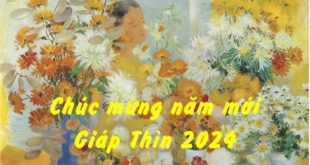
Well known for launching the “Boat for Vietnam” campaign in the late 1970s to rescue Boat People fleeing the newly-established communist regime, in 1985 he filed the very first Complaint at the United Nations against the Vietnamese government for violations of human rights. He died on 26 January 2023, aged 87.
Tireless defender of human rights and Buddhism in Vietnam, poet and author, well-known in France for having launched the campaign “A boat for Vietnam” in the late 1970s to rescue boat people fleeing the new communist regime, Vo Van Ai died on January 26, in Paris from complications after heart surgery. He was 87 years old.
His action during his exile in France was carried out through two organizations he founded after the fall of Saigon in 1975: the Vietnam Committee fon Human Rights and the review Quê Me: Action pour democracy in Vietnam, printed at the printing press he opened in Gennevilliers (Hauts-de-Seine). Devoted to human rights, democracy and Vietnamese culture, Quê Me (which means “homeland”) had a considerable influence both on the Vietnamese diaspora as well as inside Vietnam, where it was circulated clandestinely.
Vo Van Ai was one of the first, via his NGO, to reveal the repressive campaigns of the Vietnamese Communist Party. In 1978, he drew up a map of the “gulag” in his country, which included some 150 re-education camps. In November 1978, deeply shocked by the fate of 2,500 Vietnamese refugees stranded on the Hai-Hong, a freighter which the authorities of Indonesia and then Malaysia refused permission to dock, he launched a campaign to charter a ship, Ile- of-Light, to rescue boat people in distress.
Support for independence
His initiative came up against the reluctance of part of the French left who campaigned against the Vietnam War: he was even the target of intimidation measures by the communist authorities of Gennevilliers and a failed attempt to set fire to his printing press. But Vo Van Ai managed to rally the support of André Glucksmann, Olivier Todd, editor-in-chief of L’Express, Lionel Jospin, Yves Montand and Simone Signoret, as well as Simone de Beauvoir and Jean-Paul Sartre. During this time, the appeal “SOS, a boat for Vietnam”, showing the face of a child and a sinking cargo ship, flourished in the French press. The campaign had a huge impact in France, where many Vietnamese asylum seekers would subsequently be given a home.
Vo Van Ai was born on October 19, 1935 (although his “official” birth date is 1938). He was born in the mountains of northern Vietnam, where his father, a telegraph operator in the French colonial administration, had been sent to work. He grew up in Huê, the former imperial capital, and his family’s hometown. He was part of a Buddhist youth movement that was also covertly supportive of the movement for independence.
At the age of 11, he was arrested by the general security, the colonial administration’s political police. He told his family that he had been suspended in the air by a rope attached to his wrists behind his back. He witnessed the torture practiced on men and women around him. He continued his involvement in support of independence by distributing leaflets or collecting donations.
In 1955, Vo Van Ai left South Vietnam, which was then governed by the Catholic and authoritarian President Diem, and where he did not feel safe because of his previous activities. He went to France, then Germany, where he began studying medicine. In Saigon, the immolation of a monk on June 11, 1963 shocked the world. Vo Van Ai then devoted himself to promoting a Buddhist peace solution to the war between South Vietnam and the Communist North. In 1963, he founded the Association of Overseas Vietnamese Buddhists, then in 1964 became the international representative, alongside Buddhist monk Thich Nhat Hanh, of the Unified Buddhist Church of Vietnam (UBCV), which obtained official status in South Vietnam after the fall of the Diem regime in 1963.
In 1985, on the tenth anniversary of the fall of Saigon, Vo Van Ai filed the first complaint for human rights violations at the UN in New York against the Vietnamese government: his file detailed over 500 pages of ongoing violations within the Socialist Republic of Vietnam. From then on, he travelled ceaselessly, making advocacy trips to international bodies, campaigning with democratic governments and parliaments and speaking each year at the United Nations Human Rights Council.
In the 1990s, Vo Van Ai also returned to the Buddhist struggle, becoming the international spokesperson for the UBCV, banned since 1975 by the communist regime. He played a crucial role in reshaping the fight for religious freedom of Vietnamese Buddhist dissidents into a broader movement for democracy in Vietnam. He was naturalized French in 2016.
Brice Pedroletti
OCTOBER 19, 1935 Born in Huong Thuy (Vietnam)
1963 Founded the Association of Overseas Vietnamese Buddhists
1978 Launched the “A boat for Vietnam” campaign
1985 Files Complaint to the UN against the Vietnamese government
JANUARY 26, 2023 Death in Paris
© Le Monde – This translation of the Obituary on Vo Van Ai is published with full authorization from Le Monde newspaper. We extend our warm thanks to Le Monde for this.
This post is also available in: French Vietnamese
 Quê Me Quê Me: Action for democracy in Vietnam & Vietnam Committee on Human Rights
Quê Me Quê Me: Action for democracy in Vietnam & Vietnam Committee on Human Rights




